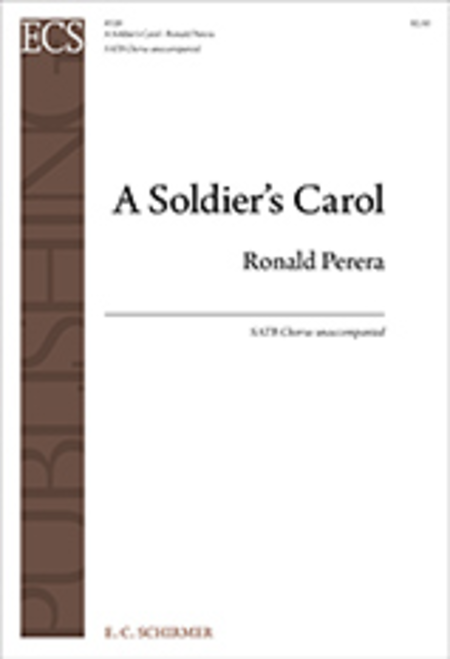A Soldier's Carol$2.85 - See more - Buy online Lead time before shipment : 1 to 2 weeks Composed by Ronald Perera. Advanced/Collegiate. Catholic Year A The Nativity of Our Lord. Secular, Christmas, 21st Century. Octavo. Duration 4 minutes, 40 seconds. Published by E.C. Schirmer Publishing (EC.8320). Instrumentation : Choral SATBSub-instrumentation : SATB A CappellaPublisher : SchirmerISBN 600313483202. This setting of the well known Christmas poem 'I Heard the Bells on Christmas Day' restores some of the language that is commonly left out of most hymnals. This setting restores some of the anguish associated with the Civil War and allows for a tension not often associated with this text. A powerful setting. "The title of the original Longfellow poem is 'Christmas Bells.' Charles Appleton Longfellow was the eldest son of the famous poet Henry Wadsworth Longfellow and Fannie Elizabeth Appleton, who lived in Cambridge, Massachusetts. In March of 1863, with the Civil War then in its third year, nineteen year old Charley ran away to Washington to join the Union Army. He presented himself for enlistment to the commander of Battery A of the 1st Massachusetts Artillery, who knew the boy. The officer contacted Henry who reluctantly gave his permission for the boy to enlist. Charley proved himself such an exceptional soldier that he was soon offered a commission as a Second Lieutenant of Artillery. He first saw action at the Battle of Chancellorsville. In June he was briefly invalided home following a bout of typhoid fever and malaria, rejoining his unit in August. Then in November, during the Battle of New Hope Church, Charley was shot through the left shoulder, the bullet just grazing his spine. He narrowly avoided being paralyzed. Henry received word of Charley's wounding on December 1, and he and a younger son went immediately to Washington, where Charley was in hospital, and brought him home to Cambridge. It was while nursing his son in his slow recovery that Henry Wadsworth Longfellow composed this poem during Christmas, 1863." -Ronald Perera Duration: 4:40.
|







